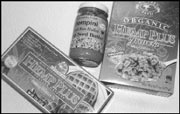GET YOUR Hemprella while you can. And your hemp chips, hemp coffee, and hemp waffles, too. After Feb. 6, many of those products will join heroin, cocaine, and ecstasy on the growing list of Schedule I controlled substances—the group of drugs considered by the Drug Enforcement Administration (DEA) to have “a high potential for abuse” and a “lack of accepted safety.”
The DEA’s decision to effectively ban all products containing detectable amounts of THC, the chemical in pot that gets you high, was announced last October by agency administrator Asa Hutchinson, who declared with apparent horror that “many Americans do not know that . . . hemp cannot be produced without producing marijuana.” The rule gave retailers four months to get THC-containing hemp products off their shelves. According to DEA spokesperson Rogene Waite in Washington, D.C., “the burden is on retailers” to identify and dispose of THC-containing products come the deadline. Seattle DEA spokesperson Tom O’Brian says, however, that the DEA won’t be staging drug raids in the granola aisle. “Is it our responsibility? Yes. Is it our priority? No,” he says.
So just how much hemp would a hemp foods “abuser” have to eat to feel even a tiny buzz? According to Eric Steenstra of hemp advocacy group Vote Hemp, you’d have to eat around 440 bags of hemp chips “to feel any effect” at all. “I don’t care how good they taste, you just can’t eat that much,” Steenstra says. Scientific tests solicited by hemp producers consortium Testpledge showed that a person would have to eat more than half a cup of pure hemp oil or nearly a pound of shelled hemp seed a day to produce a positive drug test.
One obvious problem—how to identify which products contain the chemicals without spending thousands on testing and enforcement—has been addressed in ways both creative and absurd. At Whole Foods’ Seattle store, workers were scrambling to pull the hemp nuts, hemp oil, and hemp bars before the deadline, on the assumption that the DEA would consider all hemp products to be contraband. “We have to stop selling our hemp oil,” says Whole Foods nutrition department staffer Jenna Pool. The oil, she adds, “might have like .0000001 percent THC.” Whole Foods spokesperson Kate Lowery says the grocery chain expects its suppliers to comply with the directive.
PCC Natural Markets, meanwhile, has taken a different approach. They’re assuming that as long as a product says it doesn’t contain THC, it doesn’t. PCC spokesperson Goldie Caughlin says she thinks the DEA rule borders on absurdity. “It’s a very overarching, very strange ruling,” Caughlin says. “It’s part of this whole administration’s way of approaching the war on drugs.” As an example of that absurdity, critics of the ruling have pointed to the tortured process by which the DEA determined that personal care products containing hemp—such as shampoo, lotions, and lip balms—probably don’t cause THC to enter the body and shouldn’t be included in the hemp foods ban. “However, if a personal care ‘hemp’ product is formulated and designed to be used in a way that causes THC to enter the human body, the product is not exempted from control,” the ruling says.
IT’S NOT AS IF hemp foods are exactly flying off store shelves. Although organizations like Vote Hemp and the National Organization for the Reform of Marijuana Laws (NORML) note that hemp foods are “an almost $5 million industry,” a pre-ban visit to the Whole Foods supermarket turned up exactly four hemp products: A $13 bottle of hemp seed oil, a $17 container of a greasy green product called “Hempini hemp butter,” some hemp waffles, and a box of hemp granola. The granola and waffles were OK; the “butter,” belying its price tag, was bitter and, as one prospective taster who couldn’t quite stomach the stuff put it, “gross.” PCC’s grocery buyer, Stephanie Steiner, says even though the DEA ruling “would not put us in a position where we would turn down or accept items based on it . . . our past experience has been that the hemp items just haven’t been moving.”
So what’s the point of hemp foods, anyway? People who consume hemp products say they provide the fullest possible spectrum of essential fatty acids, the fats that keep your heart healthy, your skin soft, and your hormones balanced. Fish oil and flax oil, two other supplements sold in the same section as hemp oil, don’t pack the same nutritious punch, they claim.
Producers of hemp products, a much larger industry that includes body-care products, textiles, bird seed, and rope, worry that the ruling will cripple the entire industry. “We’re expecting that they’re going to try to shut it off at the [Canadian] border,” Vote Hemp’s Steenstra says. “If a batch of hemp oil shows up at the border, my guess is that they’re not going to distinguish” between oil bound for legal uses and oil meant for human consumption. Echoing that concern, the largest exporter of hemp seed to the U.S., Kenex Ltd. of Canada, announced its intention to sue the U.S. under the North American Free Trade Agreement, seeking at least $20 million in damages stemming from the DEA’s decision. Since the ruling, Kenex president Jean Laprise said in a statement, “our U.S. hemp seed and oil sales have virtually ceased. If the DEA is not stopped, we are finished.”







